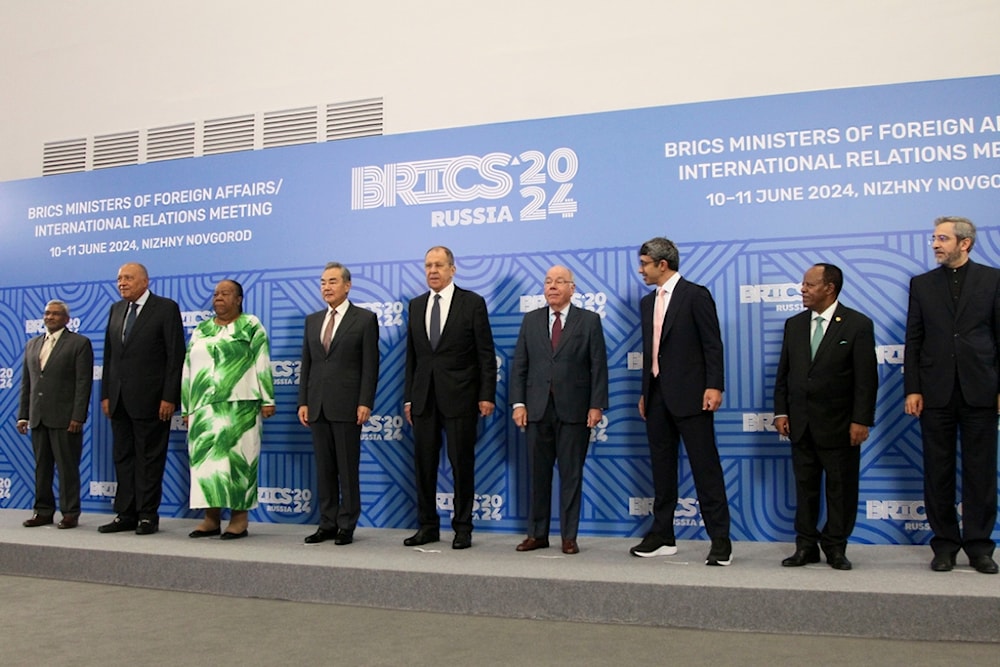BRICS ministers back mediation for Ukraine conflict resolution
The BRICS meeting saw officials from Brazil, Russia, India, China, and South Africa come together to discuss pressing global issues.
-

From left, India's BRICS Sherpa Dammu Ravi, Egypt's Foreign Minister Sameh Shoukry, South Africa's Foreign Minister Naledi Pandor, China's Foreign Minister Wang Yi, Russian Foreign Minister Sergey Lavrov, Brazil's Foreign Minister Mauro Vieira, UAE Foreign Minister Sheikh Abdullah bin Zayed Al Nahyan, Ethiopia's Foreign Minister Taye Atske Selassie and Iranian Acting Foreign Minister Ali Bagheri Kani pose for a photo on the sidelines of the meeting of BRICS foreign ministers in Nizhny Novgorod, Russia, Monday, June 10, 2024. (AP)
In a joint statement issued after their ministerial meeting on Monday, foreign ministers from the BRICS nations expressed their support for mediation proposals aimed at resolving the ongoing conflict in Ukraine.
Held in Russia’s Nizhny Novgorod, the meeting saw officials from Brazil, Russia, India, China, and South Africa come together to discuss pressing global issues.
The statement released by the Indian Ministry of External Affairs highlighted the ministers' acknowledgment of their respective countries' positions on the situation in and around Ukraine, as previously conveyed in forums such as the UN Security Council and the UN General Assembly.
They further expressed appreciation for mediation efforts and diplomatic initiatives geared towards achieving a peaceful resolution through dialogue.
"The Ministers recalled their national positions concerning the situation in and around Ukraine as expressed in the appropriate fora, including the UN Security Council and UN General Assembly. They noted with appreciation relevant proposals of mediation and good offices aimed at peaceful resolution of the conflict through dialogue and diplomacy," read the statement.
Read more: Russian forces capture Staromaiorskoye village southwest of Donetsk
In addition to addressing the Ukraine conflict, the BRICS ministers also discussed the importance of enhancing the use of national currencies in trade and financial transactions among member states.
Citing a paragraph from the Johannesburg II Declaration, the ministers reiterated the commitment of finance ministers and central bank governors to explore the issue of local currencies, payment mechanisms, and platforms, with a mandate to report back to BRICS leaders.
"The Ministers underscored the importance of the enhanced use of local currencies in trade and financial transactions between the BRICS countries. They recalled paragraph 45 of the Johannesburg II Declaration tasking the Finance Ministers and Central Bank Governors of the BRICS countries to consider the issue of local currencies, payment instruments, and platforms and to report back to the BRICS Leaders," the statement affirmed.
Rise of de-dollarization trends
The dominance of the US dollar in global reserves has been steadily declining in the past ten years. China, the second-largest economy globally, has been reducing its ownership of US Treasury bonds while increasing its gold reserves. Other countries are following suit, especially since the onset of the weaponization of the dollar.
This trend is part of a broader global de-dollarization movement, with many countries diversifying their reserves by increasing gold holdings and using local currencies for international transactions.
China's gold reserves rose in the first quarter of 2024, contributing to the country's record-high foreign exchange reserves. Meanwhile, Japan, a US ally, has been selling off US bonds and shares due to concerns about the US economy's decline and escalating debts.
Read more: SPIEF sidelines: Russia may de-dollarize with Latino nations, BRICS
Chinese financial experts suggest that while the US economy's nominal GDP growth rate may seem positive, it is partly fueled by significant inflation, leading to accumulated risks.
As emerging economies like China outpace the US and its allies, they are becoming key trade partners for many countries, potentially diminishing US trade dominance.
The share of the global economy held by BRICS countries, including Brazil, Russia, India, China, and South Africa, is currently ahead of that of the G7 developed economies.
Concerns about US government debt expansion have led several countries to pursue de-dollarization strategies to protect their economies.
The US' growing national debt, which reached $31.46 trillion, poses significant financial risks, contributing to global debt levels that are deemed unsustainable.

 4 Min Read
4 Min Read











